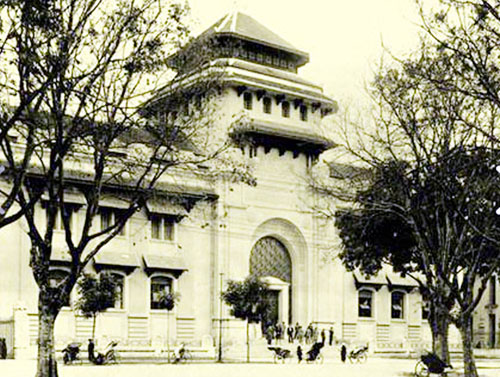
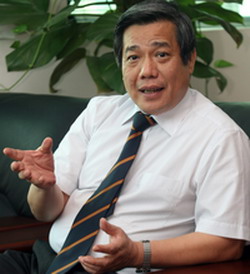
Prof. Dr. Vu Minh Giang - Chairman of the Science and Training Council, former Vice Director of Hanoi National University.
But Professor, it has been 40 years since the complete liberation and reunification of the country (April 30, 1975), but the immense historical significance and value of this event remain undiminished to this day. Could you please share your thoughts on this observation?
The Ho Chi Minh Campaign, which ended on April 30, 1975, was a momentous event in the nation's history and held special significance for the world. It was not simply a glorious victory for the Vietnamese people in their struggle against the US, but also marked the complete end of a 90-year-long national liberation struggle. After the French occupied the capital of Hue in 1885, the country fell under colonial rule. Since then, countless generations of Vietnamese people have risen up to fight for the independence and freedom of their homeland. From the Can Vuong movement to the Duy Tan movement, along with numerous armed uprisings… all demonstrated the fervent patriotism and indomitable spirit of the people, but all were brutally suppressed. It was only with the founding of the Communist Party of Vietnam in 1930 that the national liberation struggle found its correct path. Under the leadership of the Party, in just 15 years, our nation accomplished the first national democratic revolution.Independence was the first in Southeast Asia in August 1945, but the struggle for independence was not yet complete because the French army returned, forcing our people to continue the resistance for another nine years.
The earth-shattering victory at Dien Bien Phu, which forced France to sign the treaty in 1954, was a fundamental triumph, but it only secured independence for half the country. Continuing from 1955, the entire nation embarked on a protracted resistance war against American imperialism, enduring countless sacrifices and hardships, ultimately leading to our final victory on April 30, 1975.
Looking back at the entire historical journey of the Vietnamese nation in confronting foreign invaders, we affirm that the victory of April 30th was a complete culmination of nearly a century of struggle for independence, sovereignty, and national reunification. It was the culmination of patriotism, self-reliance, strength, and aspirations of the entire nation, pent up throughout a century of foreign aggression.
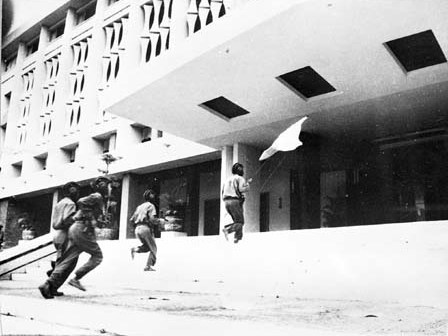
Raising the flag on Independence Palace on April 30, 1975
- Professor, what was the most significant contribution that Vietnam National University, Hanoi (formerly Indochina University, Hanoi University - the cradle of Vietnam's intellectual class in the early days) made to the cause of national liberation?
Over 100 years have passed, from the University of Indochina – the first multidisciplinary university in Indochina during the French colonial period in 1906, to the University of Hanoi – the first university of basic sciences contributing to the development of fundamental sciences for the Vietnamese revolution in 1956, to the Vietnam National University, Hanoi today – a center for training and scientific research with a pioneering mission of innovation and creativity, leading the way in Vietnamese education. The Vietnam National University, Hanoi is proud to have been a part of the history of the national liberation struggle and has had the opportunity to make worthy contributions, leaving many imprints on the development of the country and the nation.
Many prominent and distinguished figures who made extremely important contributions to the national liberation struggle had studied at or were associated with the University of Indochina and Hanoi University. Outstanding figures such as General Vo Nguyen Giap – the legendary general of the Vietnam People's Army, and former student Dang Xuan Khu (later General Secretary Truong Chinh) – were all alumni of the University of Indochina. Many brilliant scientists in various fields and prominent intellectuals directly contributed to the resistance war. Former student and lecturer Ton That Tung – a renowned doctor known for his liver transplant techniques in Vietnam – was responsible for the health care of soldiers on the battlefield. Historian and revolutionary Tran Van Giau – a student of the famous historian Dao Duy Anh – laid the foundation for revolutionary historiography and compiled the first foundational history books of Vietnamese historiography. The renowned philosopher Tran Duc Thao, followed by early generations of researchers at Hanoi University such as Dang Thai Mai, Nguyen Tai Can...
During the war of resistance against the US, the faculty and students of the University made worthy contributions. The whole country knew of shining examples such as the hero and martyr poet Le Anh Xuan (Ca Le Hien) – a young faculty member of the History Department, University of Technology, and martyr Nguyen Van Thac… Forged through war, many faculty and students of the university matured to become outstanding leaders such as Politburo members To Huy Rua (Head of the Central Organization Department), Pham Quang Nghi (Secretary of the Hanoi City Party Committee), Dinh The Huynh (Head of the Central Propaganda Department)… They were all people who had fought on the Quang Tri battlefield, participated in the youth volunteer force to build the Truong Son Road, and served as war correspondents… And many others became leading scientists in various fields.
The outstanding intellectual figures of Vietnam National University, Hanoi are also prominent figures in the history of Vietnamese science and education over the past century. This is a great source of pride that not every training and research institution in Vietnam can boast.
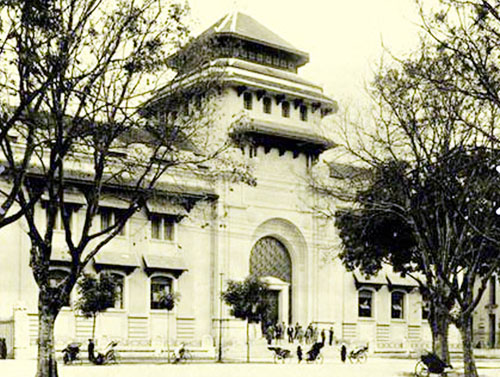
Former Hanoi University
- Besides the prominent alumni, what contributions has VNU made in specific fields, Professor?
Hanoi University and the University of Foreign Languages - the predecessor of Vietnam National University, Hanoi - played an extremely important role during the war period as educational institutions with specialized fields suitable for all activities, and made a great contribution to the cause of national liberation and reunification.
During the war against the US, when our resistance entered its most intense phase (the entire country became a battlefield), we saw the role of young scientists from Hanoi University at that time was very clear. They made remarkable contributions in weapons manufacturing, technology development, and reforms to increase labor productivity for the rear.
For example, physicists participated in the development of unmanned vehicles for defusing magnetic mines. The task of clearing magnetic mines was not only a contribution in terms of intellect and technological solutions, but this technique was particularly significant when all of Vietnam's seaports were blockaded by enemy mines. How could we open up channels and waterways to break our isolation, re-establish trade with other countries, and ensure the flow of aid via sea?
Mathematicians participated in calculating azimuths to enable artillery and anti-aircraft guns to accurately shoot down enemy aircraft and in the manufacture of modern equipment. Faculty and staff of the University of Foreign Languages, using their powerful weapon—language—as a bridge, made many concrete contributions in working with Soviet experts, interrogating prisoners of war, and engaging in diplomatic struggles. Notable figures include former Deputy Prime Minister Vu Khoan, a former student of the University of Foreign Languages.
Then, the contributions of the scientists of Vietnam National University to the battlefield were not only direct on the front lines but also in other fields. For example, they compiled valuable books to boost the morale of the entire population. During the fierce fighting of 1972-1973, Professor Phan Huy Le, Professor Tran Quoc Vuong, and other historians from the university participated in compiling the book "History of Vietnam." Prime Minister Pham Van Dong said that they were bringing the entire history of the nation into the battle, and the book was passed around and read by our soldiers. These were direct intellectual contributions on the battlefield.
In the harsh circumstances, the entire Hanoi University and the University of Foreign Languages evacuated to the war zone and the outskirts of the city to maintain teaching and learning with the utmost determination. The intellectuals trained at these two universities were the very force that, after the reunification of the country, could later contribute to consolidating the achievements of the revolution and the victory of the resistance war.
When the war ended, educational activities, especially at the higher education level in Saigon, seemed to be paralyzed, with the social sciences and humanities facing a crisis due to the evacuation of intellectuals from the South. However, immediately after liberation, we were able to resume normal operations at leading higher education institutions. With a strong force of scientists and intellectuals, Hanoi University and Hanoi University of Foreign Languages (now the University of Foreign Languages - Vietnam National University, Hanoi) participated in taking over and supporting universities in the South after the successful resistance war. The heads of the Faculty of Literature, the University of Science, Hue University, and Da Nang University were all from Hanoi University and the University of Foreign Languages. For example: the Faculty of Literature had Professor Phan Huu Dat as its head; the University of Science in Saigon had Professor Ly Hoa, a staff member of the Physics Department; and the head of Hue University was Professor... Nguyen Quoc Loc… Later, to build a core workforce for universities in the South, basic science staff from different generations, especially outstanding young graduates, were assigned to work there. These were our contributions as a leading research and education institution of the country to the victory of April 30th, especially in the context of building a revolutionary science and education system at that time. These are worthy contributions that history acknowledges, and we have every right to be proud.
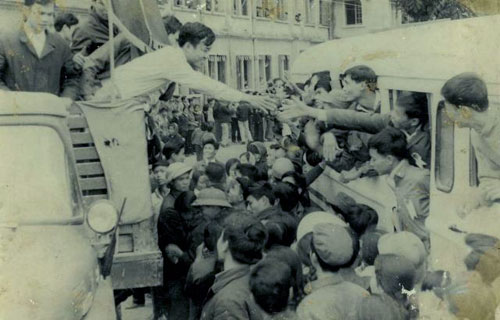
Teachers and students of the University of Foreign Languages (Vietnam National University, Hanoi) bid each other farewell as the bus carrying the students departs for the front lines.
- The history of Vietnam's national liberation struggle has a tragic yet romantic chapter: the movement of intellectuals and young people putting aside their studies to go to the battlefield and fight to the death for their country. These beautiful images have been celebrated extensively in poetry and films. Professor, could you share your memories of this movement?
It's safe to say that every time I recall these memories, I am deeply moved. Thousands of intellectuals and students from Hanoi University set aside their studies to volunteer for military service, going to the most brutal battlefields. At that time, the movement was burning brightly among the youth. Students wrote letters in blood, requesting to be drafted. They were ready to leave their loved ones and families, temporarily setting aside their books and literature to face harsh challenges. They were ready to sacrifice themselves for the Fatherland. The farewell ceremonies in the schoolyard and lecture halls were sacred and full of emotion. This army of student soldiers supporting the battlefields helped bring about a qualitative change in our troops. They brought with them a spirit of heroism, romance, and self-sacrifice into the battles.
Many exemplary figures of former faculty and students of the National University have become immortal symbols. According to statistics, 64 students and staff members of the University fell on the battlefields, and hundreds of wounded soldiers returned to continue their studies and work. Thus, not only did the staff and students of the predecessor universities of the Vietnam National University, Hanoi make unique intellectual contributions, but they also made direct contributions, shedding blood on the battlefield for the final victory of the nation.
ButProfessor, what value and motivation does that tradition hold for the current generation of scientists, students, and trainees at Vietnam National University?
Vietnam National University, Hanoi (VNU) is honored to have made indelible contributions to the nation's history in many aspects and fields, as I have shared above. This is a source of pride that not every educational institution can achieve. Having already attained this important position and valuable foundation, we must know how to multiply that strength and value. Each stage of historical development demands different tasks from each unit and individual. Now, in peacetime, without bloodshed or war, we must contribute to the development of a prosperous and strong nation, on par with advanced countries in the region and the world. This contribution is made in our own field: research and training.
How can we obtain top-tier, valuable research that solves many practical problems for national development? How can we train people with strong professional skills and good moral character, and with beautiful ideals? How can we create a healthy, high-quality academic environment? How can we be the driving force in creating and disseminating knowledge, bringing Vietnamese science and education to new heights? I have always believed that the mission of Vietnam National University, Hanoi (VNU), as clearly defined in the Law on Higher Education, in the VNU Development Strategy to 2020 and Vision to 2030, will always be the most valuable way to continue the tradition and also the most practical way to commemorate and remember the great victory of April 30th of our nation.
Thank you for sharing, Professor.
Author:Thanh Ha
Newer news
Older news